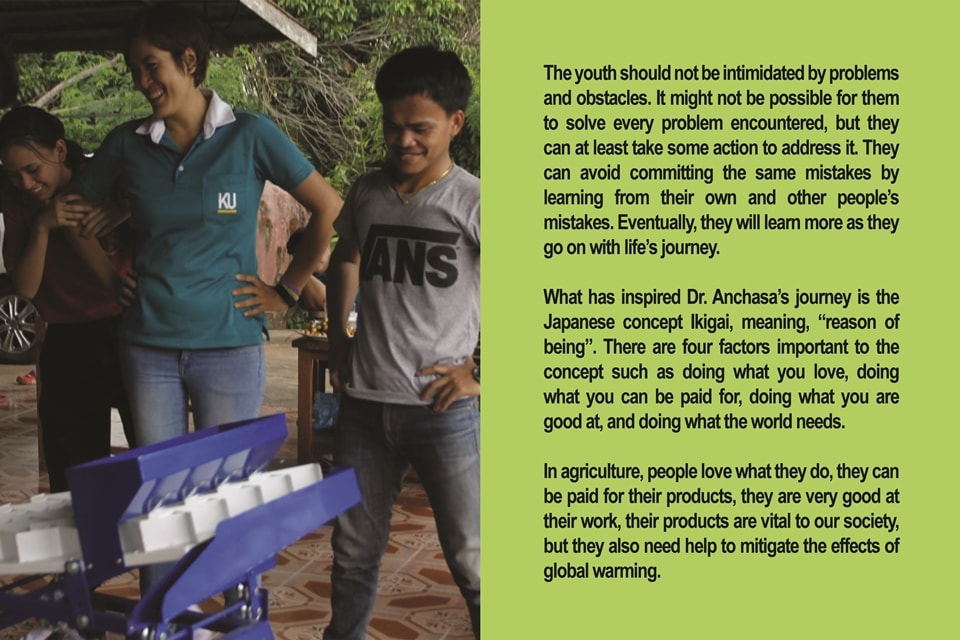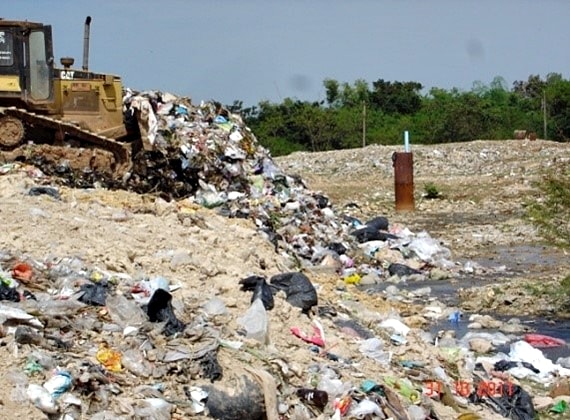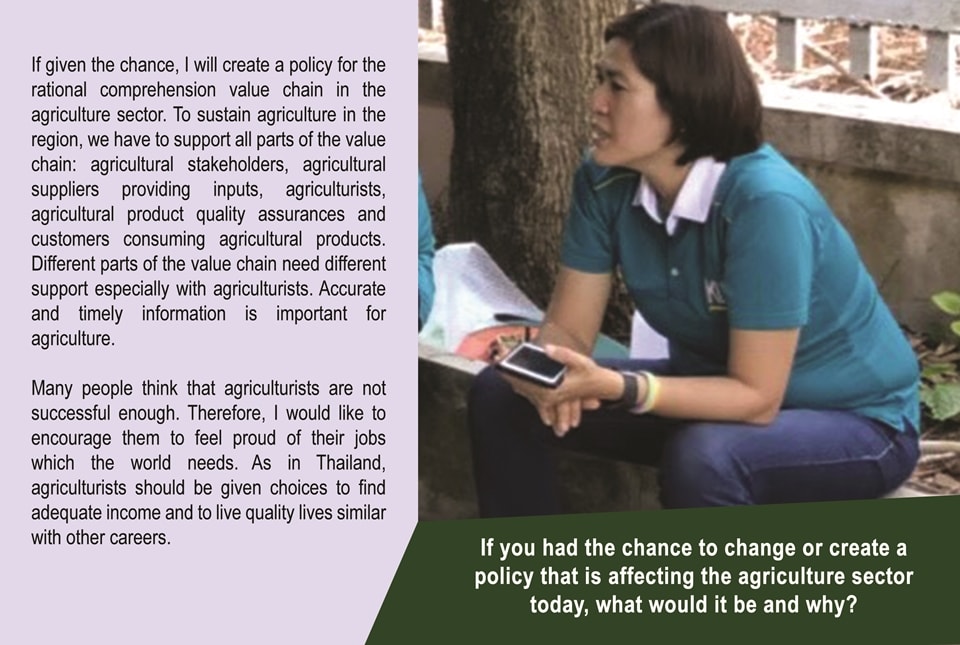SEARCA Regional Professorial Chair Grant
AY 2020-2021
Making a Difference in Agriculture
Bringing the Youth Closer to the Community with Dr. Anchasa Pramuanjaroenkij
Dr. Anchasa Pramuanjaroenkij is an Associate Professor in Kasetsart University, Thailand. She was awarded the SEARCA Regional Professorial Chair for her contributions in the field of Agriculture and Food Engineering. Dr. Anchasa considered a career in teaching in 1994, during her last year at Kasetsart University (KU) taking her Bachelor of Engineering in Food Engineering degree. At that time, the university announced the establishment of an additional KU campus in the Northeastern part of Thailand to expand the opportunity for study and accessibility to quality higher education of those living in the region.
As it was her goal to contribute to people's development and at the same time it was beneficial for her to work in the same region as her hometown, Dr. Anchasa pursued a Master of Engineering in Mechanical Engineering degree in KU.
After graduation, she started working at the new campus in Chalermphrakiat Sakon Nakhon Province under the Faculty of Science and Engineering. Since the campus' operation, more than half of the student body hailed from Northeast Thailand and a promising improvement was also seen among the students.
Dr. Anchasa pursued further graduate studies in University of Miami, Florida, USA taking up PhD in Mechanical Engineering. She has published numerous journal articles, books, and book chapters in the fields of alternative energy, thermo-fluid sciences, nanofluids, solid oxide fuel cells, agriculture and food engineering.
 Dr. Anchasa shares some advice for the youth and what has guided her own journey.
Dr. Anchasa shares some advice for the youth and what has guided her own journey.
As a community developer, Dr. Anchasa credits her colleagues, students, and everyone else she has met throughout her career for her broad perspective in life. It enabled her to continuously learn and provide instruction to her students and anyone who asks for help. She feels great joy to hear her students say that they want to continue their bachelor's degree because they want to have better lives.
Dr. Anchasa believes that in order to make a difference in a community, you need to walk a mile in other people's shoes. She regularly takes her students to rural communities to observe the people and realize the importance of listening and helping them, despite their lack of financial means. Dr. Anchasa advises her students to pursue knowledge because there are a lot of things that are yet to be discovered. It is her dream to help the future generation acquire knowledge and skills that will surpass hers.
 The Sakon Nakhon municipality landfill area
The Sakon Nakhon municipality landfill area
Dr. Anchasa sees her work in community-based projects as her greatest contribution to society. She tirelessly worked on research projects to help develop communities and alleviate the challenges the villagers face. An example of this is the Nakhon Landfill where she saw villagers exposed to biogas and garbage. She organized her class to develop measures that would lead to people's safety. She also frequently visits the landfill together with her students to continuously provide solutions to the challenges faced by the villagers.
Dr. Anchasa also contributed her expertise during the Avian Influenza outbreak which affected many local chicken farms. This led to a study on "Lab-on-a-chip" fabrication which is a cost-efficient portable device to check chicken health conditions. She also worked on the development of waste-to-energy and biogas as fuel in small engines for power generators and farm trucks without hazardous effects. She also participated in the development of a rice dryer which can utilize heat from either sunlight or heater, an affordable portable greenhouse with a humidity-temperature control system, and a machine to process sago larvae for Sago oil and meat which was based on local practices in the southern part of Thailand. Her community projects also led to her patent application on Raw Material Preparation Equipment for Communities Transforming Insects: An Oil Separation and Meat Processing Machine for Sago Beetle Caterpillar.
Dr. Anchasa extended her work on waste-to-energy system by combining it with processing and packaging systems to help communities produce their own goods using their own (waste) energy, reduce power consumption and expenses and increase income. All of Dr. Anchasa's efforts aim for the farmers to produce their own power, control production, and have a stable and sustainable source of income. This objective resonates greatly with SEARCA's Eleventh Five Year Plan (FYP) on Accelerating Transformation through Agricultural Innovation (ATTAIN) and in elevating the quality of life of agricultural families through sustainable and resilient livelihoods and access to modern networks and innovative markets.

As a recipient of the SEARCA Regional Professorial Chair and the 1st awardee from KU, Dr. Anchasa plans to use the grant to support her students who are pursuing research on community problems. It became a challenge for her students to find grants that will help them address issues in the agricultural community. In addition, the grant will be used to promote and encourage the youth to continue working in their hometown. Most families believe that working in agriculture does not provide well financially so they encourage children to pursue different careers. This resulted to the youth working in cities and industrial areas while the elderly work in agriculture.
Dr. Anchasa believes that rural development cannot be sustained by just the older generation.
The youth is also vital in sustaining traditional local wisdom, cultural ways of living, and at the same time adopting modernity in their locale which aligns with one of the priority areas set forth by SEARCA's 11th FYP on gender and youth engagement in agricultural and rural development (ARD).
As part of the grant, Dr. Anchasa will conduct a public lecture on the "Effects of global warming to agricultural food production in Thailand". She will also talk about the measures which can be done to support agricultural food production in the face of global warming such as utilizing local resources and alternative resources as well as suitable agricultural technology.